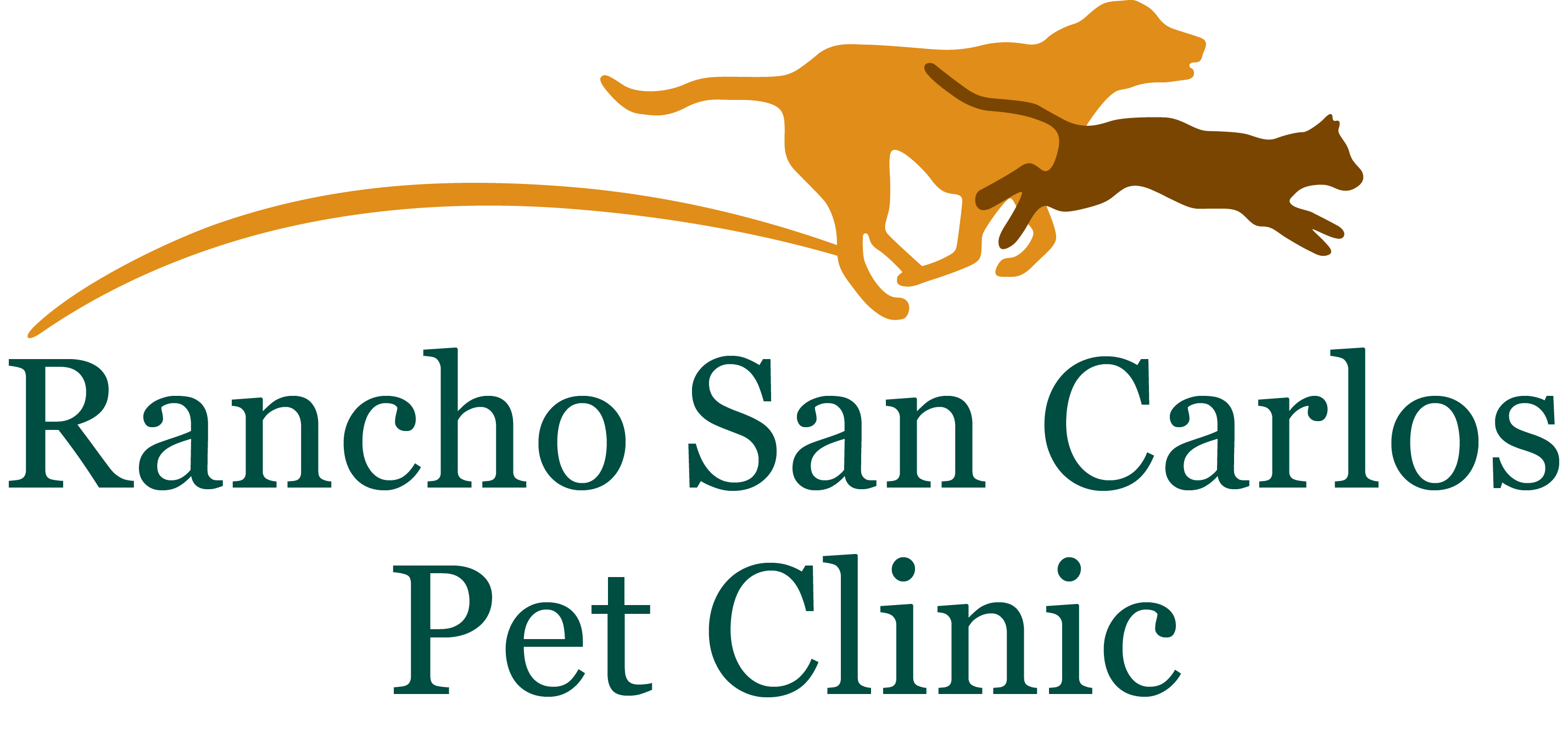Pet Wellness CareRancho San Carlos Pet Clinic
Wellness care is the most effective strategy to ensure that your pet lives a long, healthy, happy, and active life.

Pet Wellness Care

The best way to provide a long, healthy, happy, and active life for your pet is through wellness care. Routine wellness examinations will establish a baseline for your pet’s health, enabling you and our doctors to better understand your pet’s physical well-being. In addition to this, these routine check-ups are the best way to diagnose and prevent illness and disease at an early stage.
Wellness Treatments:
- Complete Physical Examinations.
- Vaccinations.
- Nail trims.
- Anal gland expression.
- Ear cleaning.
- Intestinal parasite exams (fecal exams).
- Heartworm and tick disease testing.
- Blood tests and Urinalysis.
- Flea and parasite preventatives, including pro heart injectable heartworm prevention.
Complete Physical Examinations:
A wellness examination is a standard medical check of a dog or cat who appears to be healthy rather than a medical examination of your pet who appears to be sick. A wellness exam is sometimes known as a ‘check-up’ or a ‘physical examination.’ The goal of a wellness screening is to keep your pet healthy at its best.
During a routine wellness examination, your veterinarian will ask you questions about your dog’s diet, exercise, thirst, breathing, behavior, habits, elimination patterns (i.e., bowel motions and urination), lifestyle, and general health. Your dog will also have a physical examination by your veterinarian. Your veterinarian will then make recommendations for specific preventive medicine treatments based on your pet’s history and physical examination, such as vaccination, parasite control (including preventive treatments for fleas, ticks, intestinal parasites, and heartworm), nutrition, skin, and coat care, joint health, weight management, or dental care. Your veterinarian will also discuss your dog’s specific circumstances and determine whether any further life-stage or lifestyle recommendations are warranted.
Your Veterinarian Will Observe:
- How your dog walks and stands.
- Whether or not your dog is alert and bright.
- Your dog’s overall health – whether or not your pet is of a healthy weight and condition.
- Check your dog’s muscle condition for any signs of muscle wasting.
- Haircoat- excessive dryness, excessive oiliness, dandruff, excessive shedding, or abnormal hair loss.
- Skin- oiliness, dryness, dandruff, lumps or bumps, areas of abnormal thickening.
- Eyes- redness, discharge, evidence of excessive tearing, abnormal lumps or bumps on the eyelids, how well the eyelids close, cloudiness, or any other abnormalities.
- Ears- discharges, thickening, hair loss, or any other indicators of trouble in the ears.
- Nose and face- symmetry, discharges, how well your dog breathes, and any difficulties with skin folds or other visible disorders.
- Mouth and teeth- tartar build-up, periodontal disease, retained baby teeth, fractured teeth, excessive salivation, staining around the lips, ulcers in or around the mouth.
Your Veterinarian Will Auscultate:
- The heart- listening for abnormal heart rate, rhythm, or murmurs.
- The lungs- listening for evidence of increased or decreased breath sounds.
Your Veterinarian Will Palpate:
- The pulse- listen to the chest and palpate the pulse in the hind legs at the same time, depending on the results of auscultation.
- The lymph nodes- looking for swelling or soreness in the lymph nodes of the head, neck, and rear legs.
- The legs- checking for signs of lameness, muscular difficulties, nerve problems, paw or toenail problems.
- The abdomen- feeling the bladder, kidneys, liver, intestines, spleen, and stomach to see if they appear normal or abnormal and if there is any faint evidence of discomfort.
In other circumstances, you may not even be aware that your veterinarian is performing some aspects of a typical physical examination, especially if no abnormalities are found.
Vaccinations:
In line with our goal of low-stress wellness care, Rancho San Carlos Pet Clinic only carries high-quality vaccines with minimal additives and in small volumes. A smaller volume means less discomfort for your pet following an injection. We carry adjuvant-free Rabies vaccines for cats which greatly reduces vaccine reactions. We have intranasal FVRCP to avoid an injection completely. We also provide the Bordetella vaccine to dogs by mouth so no injection is needed. Vaccines are given based on lifestyle and risk assessment and are decided based on your pet’s unique lifestyle.
Titers: In some cases, vaccination is not always appropriate, or we need more information to make our risk assessment. For some pets, vaccine titers may be more appropriate. A titer is a blood test to check your pet’s antibody level against disease.
Nail Trims:
Regular nail trimming can assist in maintaining a healthy foot structure and avoid nail damage and curling, both of which can lead to infection.
Anal Gland Expression
The Anal glands’ function is to create a fluid with a distinct odor (a pungent, fishy stench) that is unique to each dog. It’s thought that a small amount of this fluid is used to mark territory. When dogs are afraid or frightened, they might also express their anal sacs involuntarily.
Signs of Anal Gland Problems:
- Scooting the rear end along the floor or lawn
- Excessive licking or itching of the anal area
- Straining or difficulty with defecation (pooping)
- Blood or pus in the stool or near the rectum
Causes:
Certain factors may increase the chances of a dog’s anal glands becoming affected, infected, or abscessed:
- Chronic skin dermatitis.
- Obesity.
- Insufficient dietary fiber.
- Chronic soft stool.
- Food and/or environmental allergies.
- Genetics: While smaller breeds are more likely to have problems with their anal glands, no breed is immune.
Treatment:
If your dog is exhibiting signs and symptoms of an anal gland condition, our team will come up with a treatment plan to reduce symptoms. The sacs can be manually expressed by your veterinarian. If there is an illness, an antibiotic or supplement may be provided.
Ear Cleaning:
Taking the effort to clean your pet’s ears has a variety of short- and long-term advantages, including:
- Improve hearing.
- Avoid ear infections and trapped water.
- Flush out mites, ticks, and other critters.
- Prevent itchiness or other discomfort in the ears.
Intestinal Parasite Exams (fecal exams):
Fecal examinations are microscopic inspections of your pet’s waste. A fecal exam’s main purpose is to detect and treat any intestinal illnesses that may be threatening your pet’s overall health.
Fecal exams are conducted to see if your dog or cat has hookworms or roundworms in their intestines. Not only do parasites make pets uncomfortable and unpleasant, but they can also lead to more serious health problems for your pet or even be passed on to family members.
It’s simple to get ready for your pet’s fecal exam. Simply get a fresh feces sample and bring it on the same day as your appointment. It’s ideal to bring your pet’s feces sample into the clinic within 4 to 6 hours of collection for the most accurate findings.
Heartworm and Tick Disease Testing:
Dogs frequently show no clinical indications in the early stages of the disease, especially if they carry a small number of worms. Clinical signs such as aversion to exercise, fast weariness with exertion, coughing, and occasionally collapse become more obvious as the disease advances. Congestive heart failure develops in dogs with advanced illnesses. Congestive heart failure causes dogs to lose weight, acquire poor body condition, breathe quickly or laboriously, and develop a fluid build-up in the abdomen.
The American Heartworm Society recommends the Heartworm Antigen Test as the preferred testing technique for adult heartworm infection. This test is designed to detect adult female heartworms only. Antigen is detected 6 and a half to 7 months after infection, and positive results can be obtained in the heart with as few as 1 to 3 adult females.
Blood Tests and Urinalysis:
Blood and urine testing for your cat or dog on a regular basis might reveal a lot about their health. Blood testing can check for indicators of disease and ensure that internal organs are functioning properly. Urine analysis can aid in the detection of infections and diabetic symptoms. Laboratory tests can aid in the early detection of potential health issues in dogs and cats.
Bloodwork should be checked at least once a year for most cat and dog breeds. A complete blood count (CBC) evaluates your pet’s red blood cells, white blood cells, and platelets as part of a standard blood test.
There is also a lot that a vet can tell about your pet’s health from their urine. In fact, the color of your urine can help you diagnose certain illnesses. Urine that is too black, for example, could suggest kidney disease in your pet.
Your pet’s urine analysis will also test for items that shouldn’t be in their urine. Protein, sugar, or blood are all examples of this. If your pet’s urine contains any of these substances, our veterinarians will need to conduct additional tests to rule out diabetes, urinary tract infections, bacterial infections, or kidney stones.
Flea and Parasite Preventatives:
You may not realize your pet has fleas until the number of fleas grows to the point that your pet is visibly distressed. Flea bites can cause minor redness to intense scratching, which can result in open sores and infections (“hot spots”). The black flea droppings left on your pet’s coat are one of the first things you’ll notice if your pet has fleas. Fleas may not be visible, yet they can still be found on your pet and in the environment.
Our team will recommend an appropriate flea treatment strategy for your pet based on your needs, your pet’s needs, and the severity of the flea infestation. Flea-prone pets should be treated with a flea preventative during the flea season. Your veterinarian will be able to recommend the best product for your pet.
